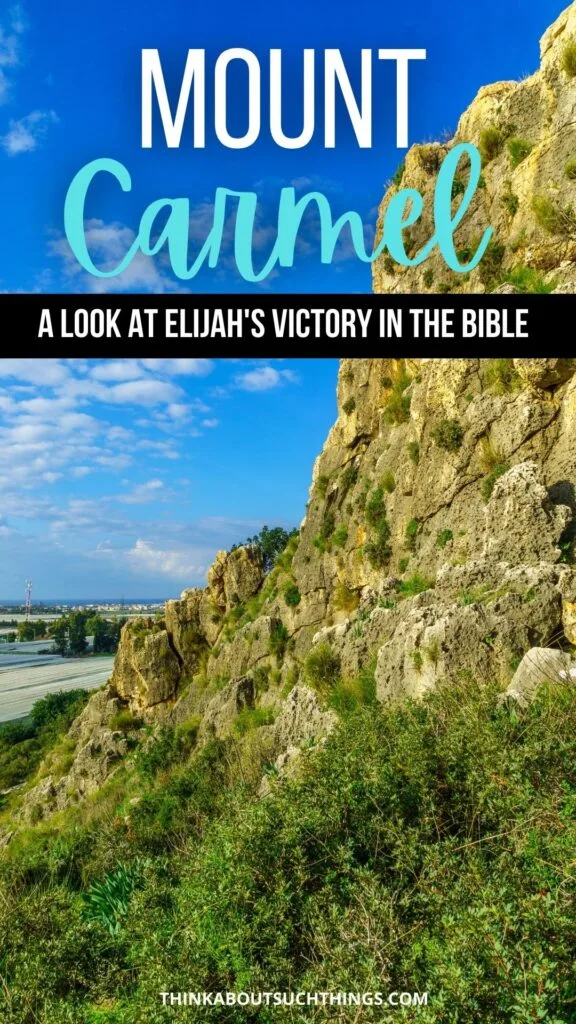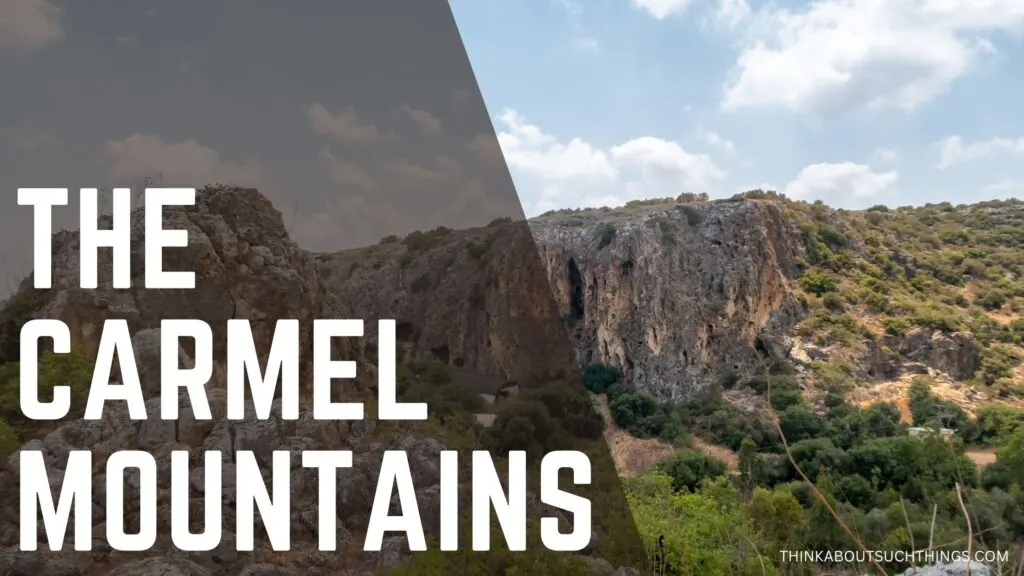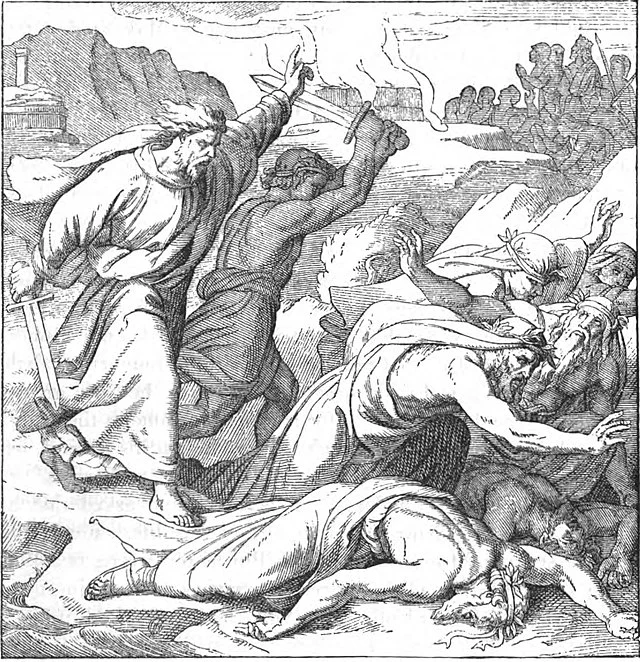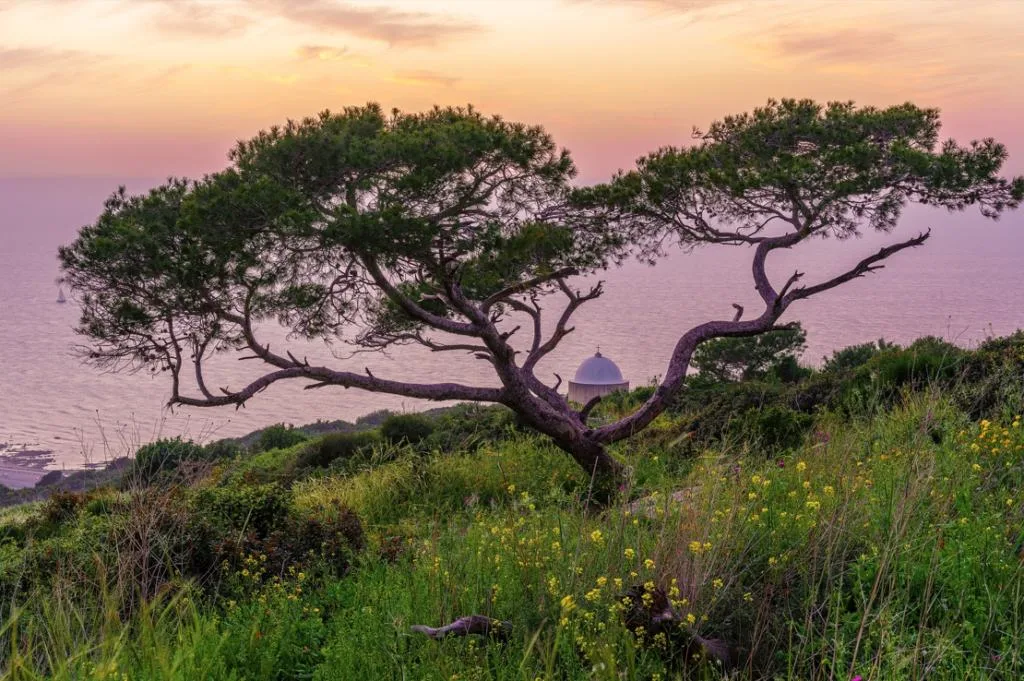In this article, we are going explore Mount Carmel in the Bible and one of the most famous stories involving it, when Elijah experiences victory in 1 Kings 18. So, grab your Bible, and let’s learn…
Mount Carmel has always been a place shrouded in mystery and wonder, its significance in the Bible undeniable. In an age where we could all use a little divine inspiration, I can’t help but think of the amazing story of the prophet Elijah and his victory on this very mountain.
The confrontation between the prophet Elijah and the false prophets on Mount Carmel is one of the most incredible victorious events ever recorded in the Bible, apart from the resurrection of Jesus.
Elijah’s victory is just as relevant today as it was all those millennia ago, and Mount Carmel remains a powerful symbol for us today.
But what makes Mount Carmel, and the events that occurred there, relevant to modern believers? We are gonna dig in and find out.

Mount Carmel In The Bible
It shall blossom abundantly and rejoice,
Even with joy and singing.
The glory of Lebanon shall be given to it,
The excellence of Carmel and Sharon.
They shall see the glory of the Lord,
The excellency of our God. – Isaiah 35:2 NKJV
Mount Carmel is a mountain range near the Mediterranean coast in western Israel, and it formed part of Israel’s Northern Kingdom in Old Testament times.
The word Carmel means “garden,” “orchard,” or “vineyard,” (H3754) and the range probably got its name from the fact that it was once covered with forests and lush vegetation.
כַּרְמֶל karmel, kar-mel’; from H3754; a planted field (garden, orchard, vineyard or park); by implication, garden produce:—full (green) ears (of corn), fruitful field (place), plentiful (field).

During Biblical times, the northern (and highest) peak of Mount Carmel received plentiful rainfall, which contributed to the natural beauty of the mountain range.
We know that Carmel was picturesque from the words of Isaiah, where he compared God’s restoration to the “majesty of Carmel and Sharon” (Isaiah 35:2), as well as Solomon’s words in Song of Solomon 7:5 describing his love’s head as “crowning her like Carmel.”
>> Check out: Mountains in the Bible: Symbolism and Significance
What Is The Significance Of Mount Carmel In The Bible?
Looking at the symbolic significance or meaning of Mount Carmel, we see that because of its lush vegetation and streams of water, Carmel was often symbolic of beauty, fertility, and growth.
Shepherds let their flocks graze on the slopes of Mount Carmel in the days of King David, and it’s possible that Carmel was the mountain of protection David often referred to in his Psalms since he and his men hid there when King Saul was hunting him.
The fertility and growth aspects seem to be Carmel’s most prominent features, though, which led to two distinct views in the people of the Old Testament:
- The righteous people realized that even Mount Carmel, with its lush vegetation and plentiful rainfall, depended on God’s providence.
For example, the prophets Amos and Nahum warned the people that God would dry out and wither the top of Mount Carmel if they carried on with their idolatry (Amos 1:2, Nahum 1:4). - The unrighteous saw the mountain as a place to worship their idols, perhaps because it was the highest point in the land (and thus closest to their “gods”) or because its fertile ground convinced the people that this was where their “gods” dwelled.
This shows how people can see the same blessing from God in two very different ways.
On the one hand, we have people who see Mount Carmel as a symbol of God’s providence and protection.
David and Elisha both hid in the caves of Mount Carmel at times when they were in trouble, basking in the shelter and provision of the Most High.
On the other hand, we have King Saul, who built a monument to himself on the mountain (1 Samuel 15:12), and all the idolatrous kings and priests of the nation who erected their altars and idols there.
Among them were King Ahab and his wife, Queen Jezebel, who told the people to worship Baal and Ashtoreth on the heights of Mount Carmel.
As we will see in a moment, the spectacular incident with Elijah on Mount Carmel perfectly reflected this duality.
Elijah On Mount Carmel
Let’s now explore the amazing story of Elijah on Mount Carmel!

1 Kings 17 and 18 tell us how God sent a drought to Israel during the rule of King Ahab and Queen Jezebel. The prophet Elijah told King Ahab that God would strike the land with drought because of the nation’s wickedness and idolatry, as shown in 1 Kings 16:30-33.
Now Ahab the son of Omri did evil in the sight of the Lord, more than all who were before him. 31 And it came to pass, as though it had been a trivial thing for him to walk in the sins of Jeroboam the son of Nebat, that he took as wife Jezebel the daughter of Ethbaal, king of the Sidonians; and he went and served Baal and worshiped him.
32 Then he set up an altar for Baal in the temple of Baal, which he had built in Samaria. 33 And Ahab made a wooden image. Ahab did more to provoke the Lord God of Israel to anger than all the kings of Israel who were before him. – 1 Kings 16:30-33.
The drought lasted for three years, after which Elijah challenged Ahab to let the people of Israel gather at Mount Carmel, where he would face the 450 prophets of Baal and 400 prophets of Asherah, 850 in total.
Let’s quickly review the facts:
- There was a drought in the land that was so great that King Ahab himself went out to search for places where the animals could graze (18:5 and 6).
- Ahab had been killing as many of God’s prophets as he could and searching for Elijah throughout the three years since the original prophecy about the drought to kill him (verse 10).
- Elijah stood alone before King Ahab and challenged him, Queen Jezebel, the people of Israel, and the 850 idolatrous prophets to meet him at Mount Carmel – the same ground where people worshiped the idols.
(What does that say about our tendency as believers not to want to go into “unholy” places, even if it is to spread the gospel?)
We can see the last remaining prophet of the One True God, who can let the land prosper or wither (as He did to Carmel), facing off against the prophets of the same idols who took over the mountain, promising prosperity the people never got.
Elijah then told the people to choose between serving God and worshiping Baal. When they did not answer, he challenged the Baal prophets to prove their god was worthy of worship.
They erected an altar, and Elijah’s challenge was that the god who set fire to the sacrifice on the altar would be the one who was worthy to be worshiped.
Baal’s prophets saw this as a simple task. After all, they were on the highest point in the land, so how difficult could it be to get their god’s attention?
And they went at it with zeal, from the morning until the afternoon, crying out and cutting themselves with swords and lances.
It seems Elijah enjoyed the spectacle. He even taunted them to cry louder, as we can see in verse 27:
“Cry aloud, for he is a god. Either he is musing, or he is relieving himself, or he is on a journey, or he is asleep and must be awakened.”
He literally told Baal’s prophets to cry louder because their god might be in the bathroom!
Eventually, Elijah had had enough and repaired the altar of the Lord, which the people had torn down. He prepared the altar with wood and the bull for sacrifice.
But more than that, he dug a trench around the altar and instructed people to fill up four jars of water and pour them over it. They did that three times until the trench was filled with water.
Let’s take a step back and appreciate that he gave this instruction during a terrible drought. All that water could have been used to quench people’s thirst, and he poured it over the very things that had to burn soon—two extreme contradictions in one act.
With all the people of Israel gathered around him, in the presence of King Ahab and Baal’s prophets, Elijah prayed two sentences to the One True God.
Verses 36 and 37 tell us what he prayed:
“O LORD, God of Abraham, Isaac, and Israel, let it be known this day that You are God in Israel, and that I am Your servant, and that I have done all these things at Your word. Answer me, O LORD, answer me, that these people may know that You, O LORD, are God, and that You have turned their hearts back.”
After all the crying, screaming, and cutting that the Baal prophets did with no answer, those two sentences from Elijah were enough. Fire fell from heaven, consuming the offering and wood and even lapping up the water in the trench.
The people immediately repented, fell on their faces, and proclaimed that the Lord alone was God. At Elijah’s instruction, the people captured the prophets of Baal and carried them to the brook Kishon to be executed.
What Believers Can Learn From Elijah On Mount Carmel

Elijah’s victory was spectacular. Yes, we know that the people eventually forgot and that Jezebel’s evil wasn’t eradicated from the land yet. But this planted a seed that led to a great revival of people turning back to the One True God.
So, what can we learn from Elijah’s actions?
- Elijah had unwavering faith. He believed in God in a way that would put most modern believers to shame. He had no physical evidence to base his bold claims on, only the word of the Lord.
Yet he acted without hesitation, believing God to be true to His word. If only we could do the same as modern believers, we would see the glory of God manifest on earth far more frequently. - Elijah did not succumb to fear. He knew that if his challenge was to go unanswered by God, he would be killed, and the kingdom would be forever lost to the idols.
He knew that he was mocking and taunting demonic forces, yet he knew that his God was greater than them, and as long as he acted within God’s will, no harm could come to him.
It’s easy for us to say that, yes, Elijah was a great prophet, so it was easy for him. However, consider that the very next chapter sees Elijah falling into a dark depression after one threatening note from Jezebel, and we can see he is only human.
Furthermore, look at Matthew 11:11. Jesus talks about John the Baptist and claims that nobody has ever been greater than John.
This means even Elijah wasn’t as great as John the Baptist. But then Jesus says, “Yet the one who is least in the kingdom of Heaven is greater than he.”
We have what Elijah did not: we have Christ living within us through His Holy Spirit. We have no excuse not to stand in unwavering faith as Elijah did.
Mount Carmel is a powerful symbol of God’s providence and protection, and Elijah’s victory over the prophets of Baal proves how far God would go to protect His people.
If we can learn to stand in faith as Elijah did, believing God’s word regardless of our circumstances, even when we feel like we’re standing alone, we, as modern believers, could surely change this world in our lifetime.
I hope you have enjoued this read on Mount Carmel in the Bible and that the story of elijah in 1 Kings 18 has truly stirred your faith!

Melissa is a passionate minister, speaker and an ongoing learner of the Bible. She has been involved in church and vocational ministry for over 18 years. And is the founder of Think About Such Things. She has the heart to equip the saints by helping them get into the Word of God and fall more in love with Jesus. She also enjoys family, cooking, and reading.
She has spoken in churches in California, Oregon, Texas, and Mexico and has been featured in Guidepost Magazine and All Recipes Magazine. Read More…
